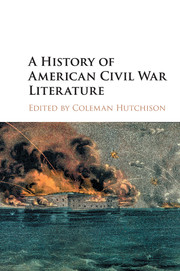Book contents
- Frontmatter
- Dedication
- Contents
- List of Illustrations
- Notes on Contributors
- Preface
- Acknowledgments
- Part I Contexts
- Part II Genres
- 6 Dépôt Culture: The Civil War and Periodical Fiction
- 7 Imitation and Resistance in Civil War Poetry and Song
- 8 Children's Literature
- 9 Writing Lives: Civil War Diaries
- 10 Civil War Memoir
- 11 Civil War Narrative History
- Part III Figures
- Recommendations for Further Reading
- Index
7 - Imitation and Resistance in Civil War Poetry and Song
from Part II - Genres
Published online by Cambridge University Press: 05 December 2015
- Frontmatter
- Dedication
- Contents
- List of Illustrations
- Notes on Contributors
- Preface
- Acknowledgments
- Part I Contexts
- Part II Genres
- 6 Dépôt Culture: The Civil War and Periodical Fiction
- 7 Imitation and Resistance in Civil War Poetry and Song
- 8 Children's Literature
- 9 Writing Lives: Civil War Diaries
- 10 Civil War Memoir
- 11 Civil War Narrative History
- Part III Figures
- Recommendations for Further Reading
- Index
Summary
Sometime around the midpoint of the nineteenth century, a freeborn African American man living in Ohio, penned alternate words for a popular nationalist anthem:
My country, ‘tis of thee,
Dark land of Slavery,
In thee we groan.
Long have our chains been worn –
Long has our grief been borne –
Our flesh has long been torn,
’en from our bones.
Although from an impoverished background, Joshua McCarter Simpson had managed to work his way through four years at Oberlin. Thereafter he worked as an herb doctor and a conductor on the Underground Railroad. Moving in the abolitionist circles of the Western Reserve, Simpson began to write and perform alternate versions of well-known anthems and popular songs, folding satire and critique into these antislavery writings. In his “Song of the Aliened American,” Simpson underlines that for enslaved African Americans the phrase “My Country” is fraught with painful contradictions. While Samuel Francis Smith's original lyrics for “America” foreground a singular “I” in the first and second verses, Simpson moves to a collective “we” of suffering blacks already in his first verse. Moreover, by replacing “liberty” from the original with “slavery” in his revision, Simpson underlines that the experience of collective national feeling that is the birthright of every white American is denied to blacks, whether free or enslaved. By writing new lyrics for “America,” Simpson underlines the exclusion of African Americans from the ideals of freedom on which the nation was founded. Drawing rhetorical power from his readers’ and listeners’ knowledge of the anthem “America,” Simpson critiques the nation's hypocrisy; the well-known tune brings dignity and moral authority to the abolitionist arguments Simpson presents.
This cultural practice of rewriting source texts for new political purposes lies at the heart of Civil War-era poetry, as writers from a wide variety of backgrounds talk back to songs, poetry, journalism, and other discourses in their work. Dialogic responses make this body of work particularly exciting for scholars, upending our expectations about “high” and “low” literary forms. When Edmund Wilson influentially dismisses the poetry of the Civil War as “versified journalism,” he misreads the cultural position of poetry in this era.
- Type
- Chapter
- Information
- A History of American Civil War Literature , pp. 96 - 118Publisher: Cambridge University PressPrint publication year: 2015

